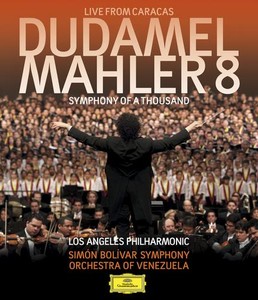 |
 |
|


alternatively
MDT
AmazonUK
AmazonUS
|
Gustav MAHLER (1860-1911)
Symphony No. 8 Symphony of a Thousand (1906) [90:00]
 Manuela Uhl (soprano) - Magna Peccatrix
Manuela Uhl (soprano) - Magna Peccatrix
Julianna Di Giacomo (soprano II) - Una poenitentium
Kiera Duffy (soprano III) - Mater gloriosa
Anna Larsson (contralto I) - Mulier Samaritana
Charlotte Hellekant (contralto II) - Maria Aegyptiaca
Burkhard Fritz (tenor) - Doctor Marianus
Brian Mulligan (baritone) - Pater ecstaticus
Alexander Vinogradov (bass) - Pater profundus
Coro Sinfónico Juvenil Simón Bolívar de Venezuela
Niños Cantores de Venezuela
Schola Cantorum de Venezuela
Schola Juvenil de Venezuela
Los Angeles Philharmonic, Simón Bolivar Symphony Orchestra
of Venezuela/Gustavo Dudamel
Director: Michael Beyer
Picture: 16:9, 1080i full HD
Sound: PCM stereo, dts-Master Audio 5.1
Regions: all
Subtitles: Latin, German, English, French, Spanish, Chinese
Bonus: Inside the Symphony of a Thousand [18:00]
rec. live, February 2012, Teatro Teresa Carreño, Caracas,
Venezuela
 DEUTSCHE GRAMMOPHON 073 4890
DEUTSCHE GRAMMOPHON 073 4890  [90:00 + 18:00]
[90:00 + 18:00]
|
|
|
Gustavo ‘The Dude’ Dudamel and his Simón
Bolivar orchestra have given us hugely enjoyable concerts -
not least the then SBYO’s 2007 Prom that had the audience
dancing in the aisles - but none as large or as daunting as
this Mahler Eighth. With a chorus of 1,200 exuberant Venezuelans,
a roster of fine soloists and the combined Los Angeles Philharmonic
and Simón Bolivar bands playing to a packed house in
Caracas this was always going to be an emotionally charged event.
Two weeks earlier they gave a performance of this symphony at
the Shrine in LA which, by all accounts, was an acoustic nightmare.
Fingers crossed, this Venezuelan version wouldn’t be similarly
afflicted.
As a conductor Dudamel still divides opinion; some critics dismiss
him as over-rated, yet he’s capable of truly memorable
performances. His Resurrection at last year’s Prom
is a case in point; daringly slow it was also unforgettable,
everyone on stage visibly moved at the work’s incandescent
close. Their DG CD of Mahler’s Fifth was very disappointing,
but if that memorable Second is anything to go by Dudamel’s
understanding of these symphonies has deepened considerably
since then. Couple that with the raw enthusiasm of a hometown
crowd, direction by Michael Beyer and high-def sound and pictures
and the stage is set for an electrifying concert.
That said, nothing prepared me for the sea of faces behind the
orchestra, promising a veritable tsunami of choral sound. The
creative spirit is summoned forth in singing of tremendous passion
and punch; diction is crisp and clear and the recorded balance
is such that that orchestral/vocal detail is never swamped.
True, there are times when some effects are less audible than
usual - the bells, for instance - but that matters less when
momentum is this well managed and the climaxes are so splendid.
Indeed, the cry of ‘Pour thy love into our hearts’
has seldom sounded so ecstatic, or the return of ‘Veni,
creator spiritus’ seemed so triumphant. As for those mighty
cymbal clashes and the white-hot finale of Part I, they are
simply staggering in their precision and power.
Any caveats? None to speak of. The soloists are very well matched
- and surprisingly easy to hear despite the choral flood - and
the organ sound, while not massive, is more than adequate. The
real revelation here is the sheer loveliness and inwardness
of those quiet passages, which make more of an impact than usual.
Indeed, this most luminous writing reminds one that much of
Mahler’s genius, like that of Berlioz, resides in such
wondrous detail. There’s plenty of the latter in the arboreal
gloom at the start of Part II, from the bowels-of-the-earth
bass, pure horns and light pizzicati to the many woodwind
epiphanies that follow.
There’s a rapt intensity to this Faust setting;
in fact, I can’t recall this music sounding so like a
series of profound yet seamless meditations as it does here.
As for Dudamel he draws radiant sonorities from this mixed band;
those exposed harp figures are as ethereal as ever and it’s
good to hear the mandolin so clearly in the mix. The soloists
are splendid too, from Brian Mulligan’s firm and ardent
Pater ecstaticus in ‘Ewiger Wonnebrand’ to Julianna
Di Giacomo’s exquisitely sung Una poenitentium and Kiera
Duffy’s lofty, theatrically illumined ‘Komm! hebe
dich zu höhern Sphären’. The real stars of the
show are the choirs, for whom Goethe’s fine sentiments
and invocational texts - the crowning ‘Virgin, Mother,
Queen’ for one - are not just philosophical abstractions
but articles of faith.
Burkhard Fritz triggers the great finale with a ringing ‘Blicket
auf’, the choirs’ deeply felt ‘Alles Vergängliche’
adding immensely to one’s sense of trembling anticipation.
As always Dudamel is in complete control, goading his massed
forces to transfigured heights at the close. I defy anyone not
to be moved - and moved mightily - by the extraordinary blend
of passion and precision on display here, all caught in exemplary,
well-balanced sound and fine pictures. As a video performance
this Mahler Eighth is far more involving and cohesive than Riccardo
Chailly’s recent Blu-ray - review.
It surely deserves a place alongside much-coveted DVDs from
Klaus Tennstedt (EMI) and Leonard Bernstein (DG). If you don’t
mind Blu-ray sans pictures, Antoni Wit (Naxos) also offers
uplift and intoxication aplenty (review).
As bonus tracks go Inside the Symphony of a Thousand
promises far more than it can possibly deliver in just 18 minutes.
A collection of artist comments, rehearsal clips and the most
general pointers from Dudamel, it’s hardly essential viewing.
That said, I’m always struck by this conductor’s
boyish charm and infectious enthusiasm; he certainly gets a
rapturous and visibly affectionate reception from the platform
at concert’s end. Make no mistake though, behind that
affable, floppy-haired exterior lurks a fast-maturing Mahlerian
who’s destined for great things. There, I’ve said
it.
Taut, superbly controlled Mahler, performed with great conviction
and presented in top-notch sound and pictures.
Dan Morgan
http://twitter.com/mahlerei
Masterwork Index: Mahler
8
|
|















